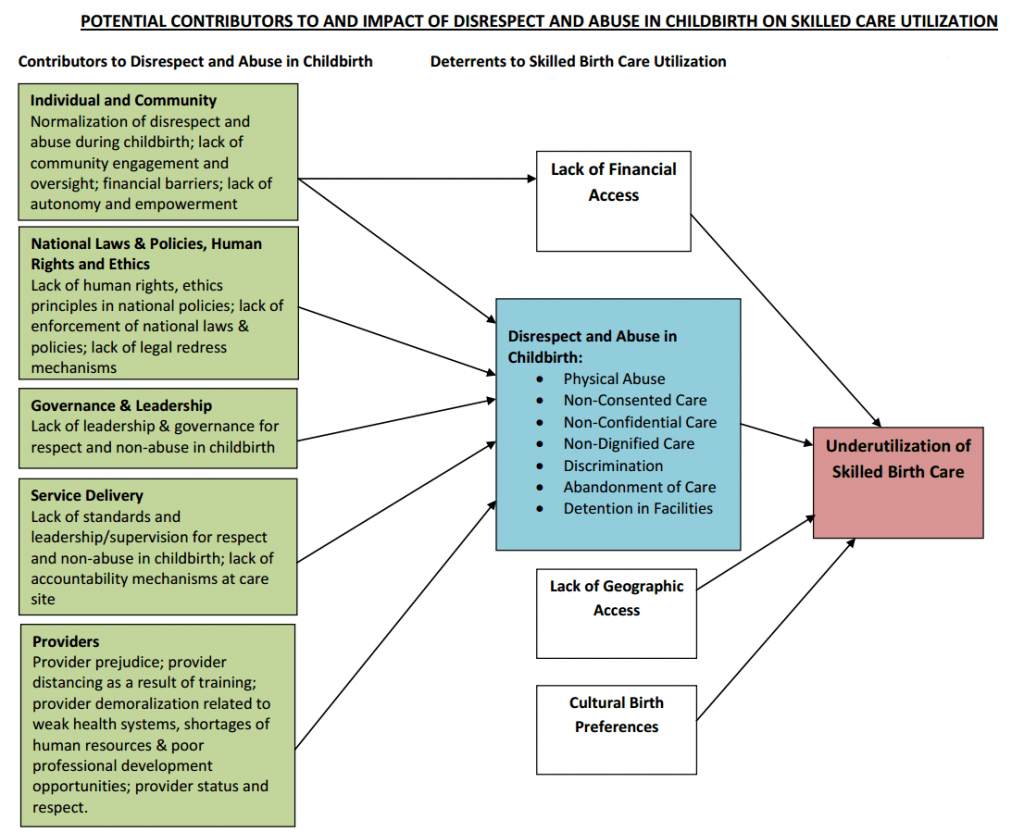A recent systematic review in PLOS One examined the quantitative and qualitative evidence on Nigerian women’s experiences of disrespect and abuse (D&A) during childbirth. The authors employed the 2010 Bowser and Hill framework to categorize and describe different types of D&A based on 14 studies. They also summarized contributing factors proposed by the authors of those studies.
Prevalence of disrespect and abuse
Physical abuse
Only one study—a questionnaire-based study by Okafor and colleagues that was conducted at a teaching hospital in Enugu—examined the prevalence of physical abuse during childbirth in Nigeria. Of the 446 women who participated, 98% reported experiencing some form of D&A during childbirth, and 36% said that they were physically abused.
| Type of physical abuse | Percent of women who reported abuse |
| Being restrained or tied down during labor | 17% |
| Episiotomy given or sutured without anesthesia | 9% |
| Beaten, slapped or pinched | 7% |
| Sexually abused by a health worker | 2% |
Non-consented care
Two studies described women’s experiences of receiving care without having been given adequate information by their provider in order to make an informed decision. The paper by Okafor and colleagues found that 55% of women experienced non-consented care for procedures such as labor augmentation, sterilization and cesarean delivery. A mixed-methods study in Enugu state examining overall satisfaction with the quality of maternal and child health services included a random sample of over 400 households. Most women expressed frustration with the lack of comprehensive information given to them when receiving maternity care:
“We want nurses who are kind, who would be patient enough to tell us what is happening to us. Most of them (nurses) do not….”
Non-confidential care
Four studies included information about violations of women’s privacy or confidentiality by care providers. Qualitative data from the Niger Delta region revealed a lack of privacy at facilities due to limited physical space. As one woman explained,
“There was not enough space in the labor room…and they don’t have the facilities. There were only two rooms and about 4 doctors…you could hear them (doctors) talking to other women.”
In a cross-sectional study from Ogun State, 16.5% of women felt a lack of privacy, and in the study by Okafor and colleagues, roughly 20% reported that confidential information—including age, medical history and HIV status—was shared with third parties without their consent.
Non-dignified care
Eight cross-sectional survey studies measured women’s experiences of negative health worker attitudes. The percentage of women who reported negative attitude ranged widely from 11% to 71%. One woman who participated in the study in Enugu state explained:
“I think the attitudes of our nurses are bad because they have no respect or mercy for a patient and they insult patients without been provoked.”
Discrimination
In the study by Okafor and colleagues, 20% of women reported discrimination based on ethnicity, socioeconomic status, age or HIV status. However, a larger percentage of women who participated in four other studies said that they experienced discrimination based on their socioeconomic status or lack of formal education.
Abandonment, neglect and detention in facilities
The percentage of women who reported that they felt abandoned, neglected or did not receive care when they needed it ranged from 10% to 29% in four studies. In Zaria, northern Nigeria, 12% of women were denied companionship during labor, and another study from southeast Nigeria found that 66% of women who requested pain relief during labor were denied. D&A extends beyond labor and delivery, however. In a southeastern Nigeria teaching hospital, nearly a quarter of women reported being detained in a facility for their inability to pay hospital fees.
Contributing factors and the way forward
Many of the studies included in the review speculated about systemic problems that may perpetuate D&A in Nigeria. Normalization of D&A in facility-based childbirth, financial barriers, women’s lack of autonomy and empowerment, poor quality clinical training related to provider-patient interaction, a lack of national laws or policies and health care workers’ demoralization due to weak health systems were commonly cited contributing factors. Many of these factors aligned with the model proposed by Bowser and Hill:

Although the literature on D&A around the globe is substantial, there have been relatively few studies conducted in the Nigerian context. The White Ribbon Alliance, along with policymakers, professional associations and community organizations, established a national standard of practice for respectful maternity care in Nigeria, but implementing specific policies remains challenging. While the issue of D&A has garnered global attention, the maternal health community must continue to ensure that every woman receives care rooted in quality, equity and dignity.
—
Read the open access systematic review in PLOS One.
Learn more about respectful maternity care.
Explore the Maternal Health Task Force’s respectful maternity care blog series.
